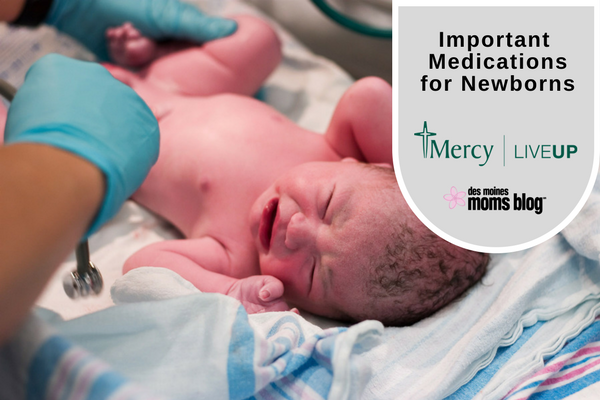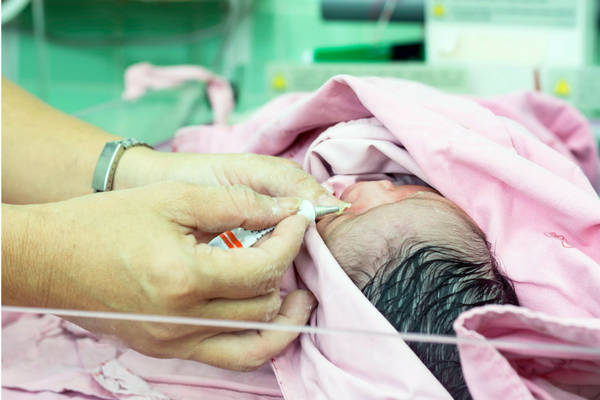 We are both pediatricians and mothers with the same parenting struggles and worries that all mothers feel. Our job is to care for babies in the Newborn Nursery at Mercy Medical Center-Des Moines. In the nursery, we understand parents have questions and concerns; especially about giving medications to their new baby, often before any visitors arrive to celebrate this new family member.
We are both pediatricians and mothers with the same parenting struggles and worries that all mothers feel. Our job is to care for babies in the Newborn Nursery at Mercy Medical Center-Des Moines. In the nursery, we understand parents have questions and concerns; especially about giving medications to their new baby, often before any visitors arrive to celebrate this new family member.
As pediatricians, we want you to be comfortable with the facts about some universal newborn medications, even if you aren’t emotionally comfortable with giving your baby medicines.
3 Medications Newborns Need
Below is a trio of medicines recommended by the American Academy of Pediatricians, American Academy of Family Medicine, and CDC, and given at every U.S. hospital. If these medicines could all be delivered without injection AND offer the same protection, every pediatrician would be recommending those new ways; but that just isn’t our current reality in 2018.
These medications are an important first step in keeping your baby healthy and establishing a trusting relationship with your newborn’s doctor. As you start your health care journey with your child, ask questions as they come up. Your doctor always wants you to be comfortable with the care of your family. Now, after two quick pokes and some eye gel, you can get back to snuggling with your little one.
Vitamin K
Vitamin K is a nutrient that helps blood clot. Older babies and adults get it from food and helpful gut flora can make vitamin K. This one-time injection at birth covers the first several months until your baby is able to obtain it from those naturally occurring sources. Without this supplement, your baby is at risk for spontaneous bleeding, most dangerously in their brain, causing permanent damage or death. Many parents ask about oral vitamin K, but this is not as effective, still leaving your baby at risk of serious internal bleeding. Find more information here.
Hepatitis B Vaccine
Hepatitis B virus infects the liver. When adults catch it, their body is generally able to fight off the virus during a one-time illness and the liver recovers. However, newborns do not have mature immune defense systems to fight off the virus and are more likely to have a long-term infection which can eventually cause liver cancer/ liver failure.
Did you wait to get the hepatitis B vaccine at your doctor’s office with your last baby? Not anymore! In 2017, the CDC and AAP recommendations were changed to give vaccine WITHIN 24 hours of birth as some babies (even babies born to moms with negative Hepatitis B lab results) were still being infected with this sneaky virus and not protected when this immunization was given after 24 hours. Find more information here.
 Antibiotic Eye Ointment
Antibiotic Eye Ointment
The eye ointment prevents two specific infections which can cause permanent eye damage or blindness – chlamydia and gonorrhea. Since it is so hard to tell the difference between normal new baby eye goo and eye drainage from early infection, we treat all newborns to prevent blindness. Find more information here.
You may ask, “What else will help keep my newborn healthy?”
Influenza and TdaP (tetanus-diphtheria-pertussis) Boosters for Parents/Caregivers
Infants need to be 6 months old to get the influenza vaccine and have full protection for pertussis (whooping cough). While these are serious infections at any age, even for adults, they are even more dangerous for younger babies. Infants can need hospital admission, IV medications, and breathing support with these illnesses.
Both the CDC and American Congress of Obstetricians and Gynecologists recommend mom get these vaccines during pregnancy so she can make and pass antibodies through the placenta to help her baby, but EVERYONE (i.e., dads, grandparents, aunts/uncles, nannies, etc.) around your little one should receive these booster immunizations to help create a healthy bubble around them. Protect yourself and protect your baby. Find more information here.
About Us
 Dr. Chloe Butler and Dr. Beth Davidson are both hospital-based pediatricians at Mercy Children’s Hospital in Des Moines. Professionally, they take care of healthy newborns in the first few days of life as well as sick kids in the hospital up until age 18. Dr. Butler has one daughter and Dr. Davidson has a son and a daughter. All of their children received these medications as newborns.
Dr. Chloe Butler and Dr. Beth Davidson are both hospital-based pediatricians at Mercy Children’s Hospital in Des Moines. Professionally, they take care of healthy newborns in the first few days of life as well as sick kids in the hospital up until age 18. Dr. Butler has one daughter and Dr. Davidson has a son and a daughter. All of their children received these medications as newborns.
Connect with Mercy Medical Center – Des Moines
Website: mercydesmoines.org
Twitter: @MercyDesMoines
Facebook: @mercydesmoines
Instagram: @mercydesmoines
Pinterest: @MercyDesMoines
The post is part of a series of sponsored post by Mercy Medical Center – Des Moines.
Tips for Potty Training Toddlers
















